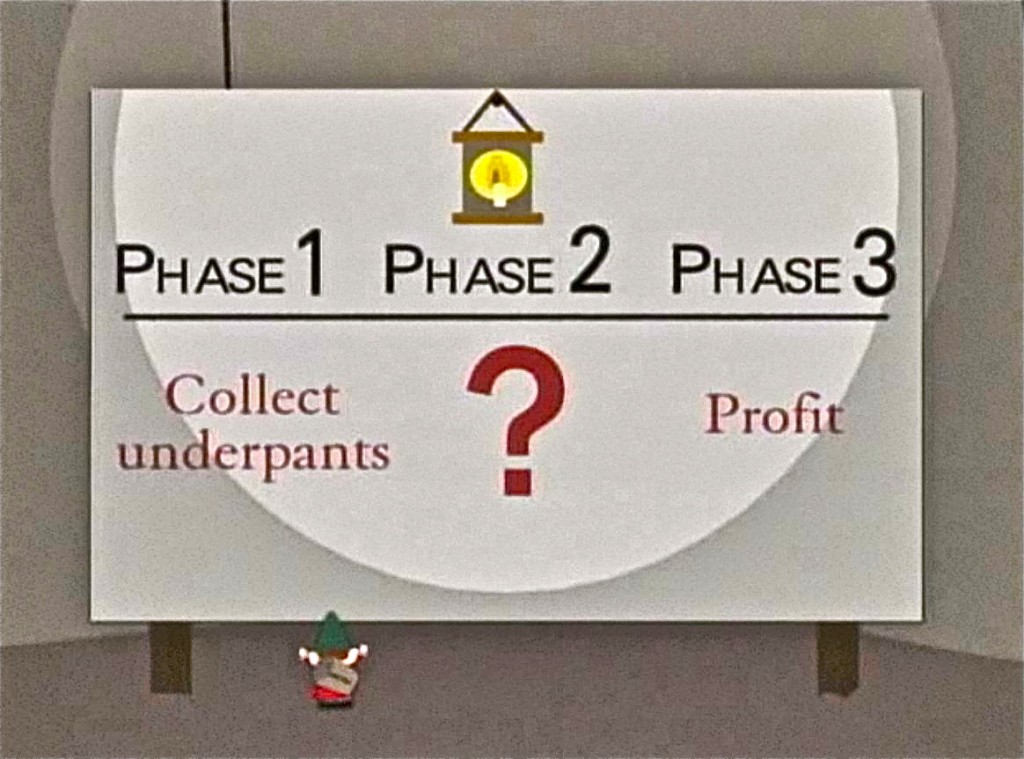Lesson Plans : Essential and Often Forgotten

https://en.wikipedia.org/wiki/Gnomes_(South_Park)
Last week was a transition point in the year. After introducing a new position at the campus, my time has finally be able to shift away from pure technology, and back to educational technology. This has been a struggle for me for more than two years. The work was needed, but now, I welcome the change.
A teacher was absent last week, and I heard some rumblings about lesson plans. As any administrator knows, no one ever says anything great about lesson plans. The norm is a nonverbal look of piercing annoyance when lesson plans are mentioned.
I actually created the school’s lesson plan archive, so I decided to explore the contents. I found many inconsistencies. I realized that unless this content translated clearly down into the classroom, outward to the parents, and internally to the curriculum mapping, it just was not worth doing.
I cannot mandate lesson planning for most departments. However, I did go to the head of the school and request that I be allowed to lead the ICT department in a brief project to clean-up lesson plans, plan for long term leave, and develop a system to help non-ICT teachers deliver ICT lessons. I was given a green light.
I met with the ICT coordinator (in my school structure I am not the head of the subject), and reviewed the issues. She agreed, and she had even better ideas than I did. The department is small, so the plan came together quickly. I formally sent an email saying that as Head of Technology and with the direct support of the Principal, all ICT lesson planning will follow this plan, etc. and here is a template. I added the words non-negotiable, to make sure I was clear.
Why People Hate Formal Planning
Here are the reasons I think most people dislike lesson planning:
- They feel like they know the material, so why does it need to be written out in detail.
- They might want to make changes, and adjust during the week, therefore it is a waste of time.
- Time. Lesson planning is time consuming.
- Plans are written for other people to read, which adds a level of formality not needed by the person writing the plan.
- No one ever checks the lesson plans, so they are a waste of effort.
- IF the school has curriculum mapping or an online class management system, lesson plans are redundant.
Why Administrators and Heads of Department Should Ignore All These Reasons
I also hate lesson planning. Only after heading a department and being an administrator did I see the value. Only after having a colleague take emergency long term leave did I realize how negatively missing lesson plans can affect an entire division of teachers and students. With this experience under my belt, I no longer support lax planning.
Let’s start with a current educational topic that seems to be part of most of the conversations I have been having in the last six years, curriculum mapping. Although a curriculum map can contain lesson plans, and although the building of a map can be done in such a way that people can search for plans down to a given day, curriculum mapping is not a process designed for day-to-day lesson tracking. The data can be very difficult to read, since it should be connect to longitudinal information spanning the entire school.
Technology should always be applied to the scope of it’s design, and the concept of a single perfect solution should be clearly avoided. Tools are used when needed, and technology is a tool. Hint: Single Sign-On, Not Secure, but It gets rid of many complaints.
Online course management systems can easily hold a lesson plan, but the breakdown of links and activities is not a lesson plan. I am often guilty of using this as an excuse for not adding a formal document to explain, in detail, a particular area of an online course. Systems like Edmodo move chronologically and the content can shift down quickly. Lesson plans get lost in systems like this unless there is a very strict standard for where the go and how they are referenced. Therefore, lesson plans can be included in online learning systems, but they probably need to “live” somewhere else.
After winning the redundancy argument, you can ignored everything else, because lesson planning is not about being convenient. It is about being accountable to the students, families, and other people in the school. It is about having something that can allow a person to subtract themselves from the equation that is the school, without leaving a huge damaging hole in the educational pathways that children follow day-to-day.
Administration and Oversight
If lesson planning is a requirement, a non-negotiable, a strain on everyone’s time, and a important- then make it important. I believe Stephen Covey said, “Do the important things first.” As an administrator or head of department that means read the lesson plans and occasionally make sure the lessons in the classroom matched the plans.
Make sure teachers know plans are being checked. Comment on good ones. Have meetings about bad ones. Make planning important by making it come before broad conversations around curriculum mapping, homework, etc.
Remember, technology for lesson planning can and should be simple. Do not over complicate your processes. If the school has some software or platform that has organically developed a smarted lesson planning process, then stick with it. However, if people are comfortable using normal documents and a shared folder, then maintain the simplicity. The second the focus shifts from good planning to high tech solutions for planning, problems will arise.
The Standard
Everything needs a measurement or a standard. For lesson planning, that standard is simple: If a stranger (Teacher-Administrator-Parent) were to read the lesson plan would they understand the learning objectives.
Not the HOW. Not the WHAT. Just the WHY and the OUTCOME.
Tony DePrato